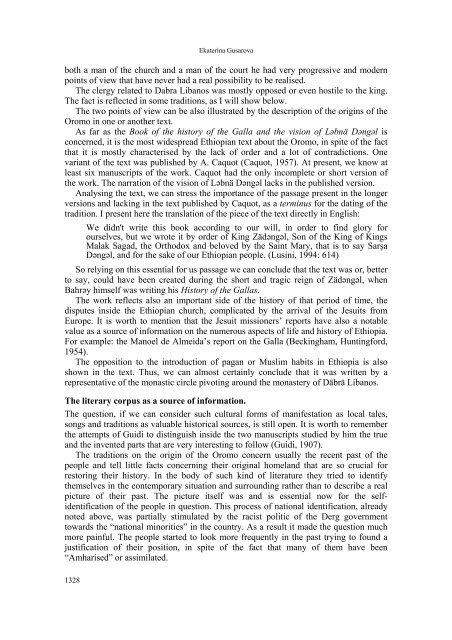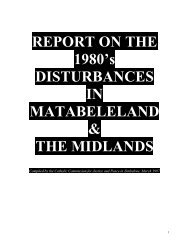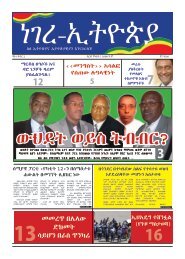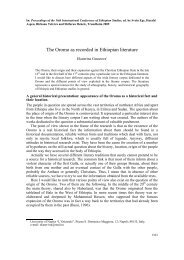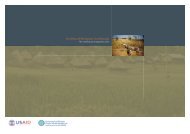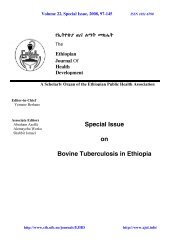Ekaterina Gusarova - The Oromo as recorded in Ethiopian literature
Ekaterina Gusarova - The Oromo as recorded in Ethiopian literature
Ekaterina Gusarova - The Oromo as recorded in Ethiopian literature
You also want an ePaper? Increase the reach of your titles
YUMPU automatically turns print PDFs into web optimized ePapers that Google loves.
<strong>Ekater<strong>in</strong>a</strong> <strong>Gusarova</strong><br />
both a man of the church and a man of the court he had very progressive and modern<br />
po<strong>in</strong>ts of view that have never had a real possibility to be realised.<br />
<strong>The</strong> clergy related to Dabra Libanos w<strong>as</strong> mostly opposed or even hostile to the k<strong>in</strong>g.<br />
<strong>The</strong> fact is reflected <strong>in</strong> some traditions, <strong>as</strong> I will show below.<br />
<strong>The</strong> two po<strong>in</strong>ts of view can be also illustrated by the description of the orig<strong>in</strong>s of the<br />
<strong>Oromo</strong> <strong>in</strong> one or another text.<br />
As far <strong>as</strong> the Book of the history of the Galla and the vision of Ləbnä Dəngəl is<br />
concerned, it is the most widespread <strong>Ethiopian</strong> text about the <strong>Oromo</strong>, <strong>in</strong> spite of the fact<br />
that it is mostly characterised by the lack of order and a lot of contradictions. One<br />
variant of the text w<strong>as</strong> published by A. Caquot (Caquot, 1957). At present, we know at<br />
le<strong>as</strong>t six manuscripts of the work. Caquot had the only <strong>in</strong>complete or short version of<br />
the work. <strong>The</strong> narration of the vision of Ləbnä Dəngəl lacks <strong>in</strong> the published version.<br />
Analys<strong>in</strong>g the text, we can stress the importance of the p<strong>as</strong>sage present <strong>in</strong> the longer<br />
versions and lack<strong>in</strong>g <strong>in</strong> the text published by Caquot, <strong>as</strong> a term<strong>in</strong>us for the dat<strong>in</strong>g of the<br />
tradition. I present here the translation of the piece of the text directly <strong>in</strong> English:<br />
We didn't write this book accord<strong>in</strong>g to our will, <strong>in</strong> order to f<strong>in</strong>d glory for<br />
ourselves, but we wrote it by order of K<strong>in</strong>g Zädəngəl, Son of the K<strong>in</strong>g of K<strong>in</strong>gs<br />
Malak Sagad, the Orthodox and beloved by the Sa<strong>in</strong>t Mary, that is to say Sarşa<br />
Dəngəl, and for the sake of our <strong>Ethiopian</strong> people. (Lus<strong>in</strong>i, 1994: 614)<br />
So rely<strong>in</strong>g on this essential for us p<strong>as</strong>sage we can conclude that the text w<strong>as</strong> or, better<br />
to say, could have been created dur<strong>in</strong>g the short and tragic reign of Zädəngəl, when<br />
Bahrəy himself w<strong>as</strong> writ<strong>in</strong>g his History of the Gall<strong>as</strong>.<br />
<strong>The</strong> work reflects also an important side of the history of that period of time, the<br />
disputes <strong>in</strong>side the <strong>Ethiopian</strong> church, complicated by the arrival of the Jesuits from<br />
Europe. It is worth to mention that the Jesuit missioners’ reports have also a notable<br />
value <strong>as</strong> a source of <strong>in</strong>formation on the numerous <strong>as</strong>pects of life and history of Ethiopia.<br />
For example: the Manoel de Almeida’s report on the Galla (Beck<strong>in</strong>gham, Hunt<strong>in</strong>gford,<br />
1954).<br />
<strong>The</strong> opposition to the <strong>in</strong>troduction of pagan or Muslim habits <strong>in</strong> Ethiopia is also<br />
shown <strong>in</strong> the text. Thus, we can almost certa<strong>in</strong>ly conclude that it w<strong>as</strong> written by a<br />
representative of the mon<strong>as</strong>tic circle pivot<strong>in</strong>g around the mon<strong>as</strong>tery of Däbrä Libanos.<br />
<strong>The</strong> literary corpus <strong>as</strong> a source of <strong>in</strong>formation.<br />
<strong>The</strong> question, if we can consider such cultural forms of manifestation <strong>as</strong> local tales,<br />
songs and traditions <strong>as</strong> valuable historical sources, is still open. It is worth to remember<br />
the attempts of Guidi to dist<strong>in</strong>guish <strong>in</strong>side the two manuscripts studied by him the true<br />
and the <strong>in</strong>vented parts that are very <strong>in</strong>terest<strong>in</strong>g to follow (Guidi, 1907).<br />
<strong>The</strong> traditions on the orig<strong>in</strong> of the <strong>Oromo</strong> concern usually the recent p<strong>as</strong>t of the<br />
people and tell little facts concern<strong>in</strong>g their orig<strong>in</strong>al homeland that are so crucial for<br />
restor<strong>in</strong>g their history. In the body of such k<strong>in</strong>d of <strong>literature</strong> they tried to identify<br />
themselves <strong>in</strong> the contemporary situation and surround<strong>in</strong>g rather than to describe a real<br />
picture of their p<strong>as</strong>t. <strong>The</strong> picture itself w<strong>as</strong> and is essential now for the selfidentification<br />
of the people <strong>in</strong> question. This process of national identification, already<br />
noted above, w<strong>as</strong> partially stimulated by the racist politic of the Derg government<br />
towards the “national m<strong>in</strong>orities” <strong>in</strong> the country. As a result it made the question much<br />
more pa<strong>in</strong>ful. <strong>The</strong> people started to look more frequently <strong>in</strong> the p<strong>as</strong>t try<strong>in</strong>g to found a<br />
justification of their position, <strong>in</strong> spite of the fact that many of them have been<br />
“Amharised” or <strong>as</strong>similated.<br />
1328


